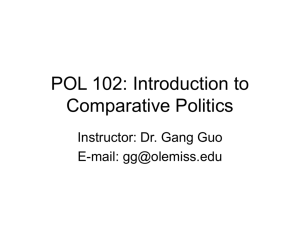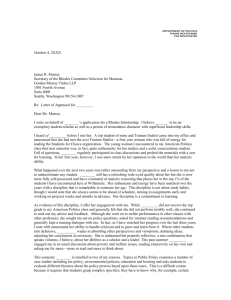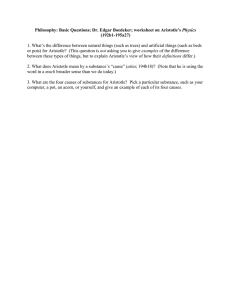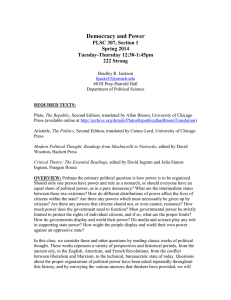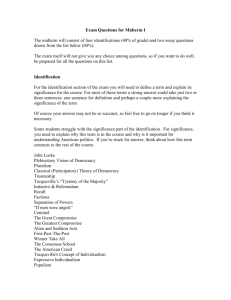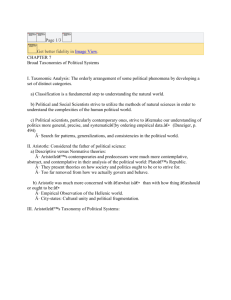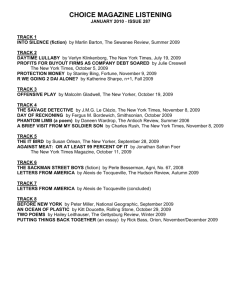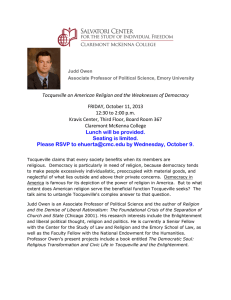Democracy and Power PLSC 307, Section 1 Winter 2015
advertisement
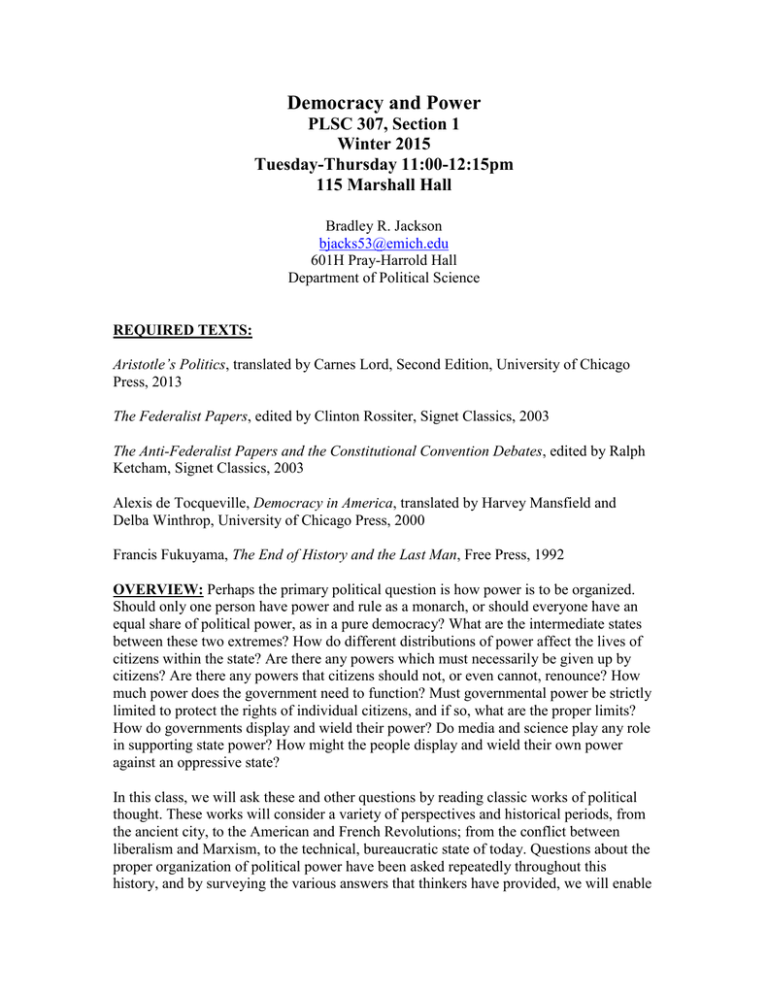
Democracy and Power PLSC 307, Section 1 Winter 2015 Tuesday-Thursday 11:00-12:15pm 115 Marshall Hall Bradley R. Jackson bjacks53@emich.edu 601H Pray-Harrold Hall Department of Political Science REQUIRED TEXTS: Aristotle’s Politics, translated by Carnes Lord, Second Edition, University of Chicago Press, 2013 The Federalist Papers, edited by Clinton Rossiter, Signet Classics, 2003 The Anti-Federalist Papers and the Constitutional Convention Debates, edited by Ralph Ketcham, Signet Classics, 2003 Alexis de Tocqueville, Democracy in America, translated by Harvey Mansfield and Delba Winthrop, University of Chicago Press, 2000 Francis Fukuyama, The End of History and the Last Man, Free Press, 1992 OVERVIEW: Perhaps the primary political question is how power is to be organized. Should only one person have power and rule as a monarch, or should everyone have an equal share of political power, as in a pure democracy? What are the intermediate states between these two extremes? How do different distributions of power affect the lives of citizens within the state? Are there any powers which must necessarily be given up by citizens? Are there any powers that citizens should not, or even cannot, renounce? How much power does the government need to function? Must governmental power be strictly limited to protect the rights of individual citizens, and if so, what are the proper limits? How do governments display and wield their power? Do media and science play any role in supporting state power? How might the people display and wield their own power against an oppressive state? In this class, we will ask these and other questions by reading classic works of political thought. These works will consider a variety of perspectives and historical periods, from the ancient city, to the American and French Revolutions; from the conflict between liberalism and Marxism, to the technical, bureaucratic state of today. Questions about the proper organization of political power have been asked repeatedly throughout this history, and by surveying the various answers that thinkers have provided, we will enable ourselves to think through these questions again for ourselves with reference to our own world. The question of how political power should be distributed is a question that remains alive today, and this class is designed to offer the conceptual resources necessary for considering these vital problems. Students will be asked to connect the thoughts and arguments found in the readings to contemporary issues in America and the rest of the world. It is hoped that this will encourage active, thoughtful engagement with contemporary events, while simultaneously adding depth to our historical and theoretical knowledge of politics. CLASS STRUCTURE: This class will have a lecture format. Primarily, we will spend class time discussing the readings. It is therefore imperative that you come to class having done the reading. If you have not done the reading, the lecture will be less useful for you. Doing the reading is necessary for another reason: classes like this are better if students come to them with questions and concerns about the material. Political philosophy is about principled discussion and debate. We will all get more out of the class if everyone comes prepared to engage in the discussion. Be sure to give yourself enough time to complete the readings. These are difficult, complicated books and what an author means will not always be immediately clear. It is important that you take time to read these works carefully, since you will be evaluated primarily on your understanding of these texts. ASSIGNMENTS: Grades in this class will be determined based on the following: (1) Six short (500 words) papers in which you relate the concepts in class to some event in the current news. These papers should attempt to use the ideas in assigned readings to ask questions about and gain insight into the contemporary political world. These papers can be turned in at any point during the semester. However, no more than one of these papers may be turned per week. Each paper should be about a different news story. You should not, for example, write two papers on the same event, even if you can find two news stories about it. Together, these papers are worth 12% of the final grade. (2) Two short essays (approx. 1500 words) on topics assigned in class or agreed upon by the student and instructor. These will be distributed one week before they are due. The first is due Tuesday February 10; the second is due Tuesday March 17. Please bring a paper copy to class the day the assignment is due. Together, these papers are worth 40% of the final grade. (3) One long essay (approx. 3000 words) on a topic assigned in class or agreed upon by the student and the instructor. Topics will be distributed two weeks prior to the due date. This paper is due on Thursday April 16, the last day of class. Please bring a paper copy to class. This essay is worth 40% of the final grade. (4) Participation. This sort of class is improved by student participation. Questions and comments are not only encouraged, they are also required and worth 8% of the final grade. GRADING SCALE: A AB+ B BC+ C CD+ D DF 96-100 91-95 85-90 80-84 76-79 72-75 68-71 64-68 60-63 55-59 50-54 <50 4 3.7 3.3 3 2.7 2.3 2 1.7 1.3 1 0.7 0 ACADEMIC HONESTY POLICY: Plagiarism of any kind will not be tolerated. This includes using direct quotes or close paraphrases without attribution. Use of Wikipedia is unacceptable, even if cited. Failure to comply with the academic honesty policy will result in a failing grade on the assignment in question as well as referral to appropriate university authorities for disciplinary action. STUDENTS WITH DISABILITIES: Students with disabilities should contact the Disability Resource Center to establish reasonable accommodations. For an appointment with a disability specialist, visit http://www.emich.edu/drc/. SCHEDULE: 6-Jan 8 13 15 20 22 27 29 3-Feb 5 10 12 Reading Assignment Introduction Aristotle's Politics Book I Aristotle's Politics Book III Aristotle's Politics Book III (cont.) Aristotle's Politics Book IV Aristotle's Politics Book IV (cont.) Aristotle's Politics Book V Aristotle's Politics Book V (cont.) Aristotle's Politics Book VI Aristotle's Politics Book VII Anti-Federalist Papers pp. 31-85 Anti-Federalist Papers pp. 86-89, 92-113, 134-165, 171-182 Assignment 1 Due 17 19 Feb 23 - March 1 3-Mar 5 10 12 17 19 24 26 31 2-Apr 7-Apr 9-Apr 14-Apr 16-Apr Anti-Federalist Papers pp. 199-217, 227-237, 256-308 Federalist Papers 1, 2, 6, 9, 10, 14 WINTER RECESS Federalist Papers 23, 37-39, 47-51 Federalist Papers 52-54, 57, 62, 63 Federalist Papers 68-72, 78, 84, 85 Tocqueville pp. 3-15, 27-58, 66-93 Tocqueville pp. 100-110, 143-172, 180-186 Tocqueville pp. 187-199, 210-235 Tocqueville pp. 235-302 Tocqueville pp. 302-384 Tocqueville pp. 399-410, 417-428, 479-492 Tocqueville pp. 500-524, 530-539, 558-578, 606-617 Tocqueville pp. 639-650, 661-676 Fukuyama pp. xi-xxiii, 3-51 Fukuyama pp. 143-208 Fukuyama pp. 287-339 Assignment 2 Due Final Paper Due
